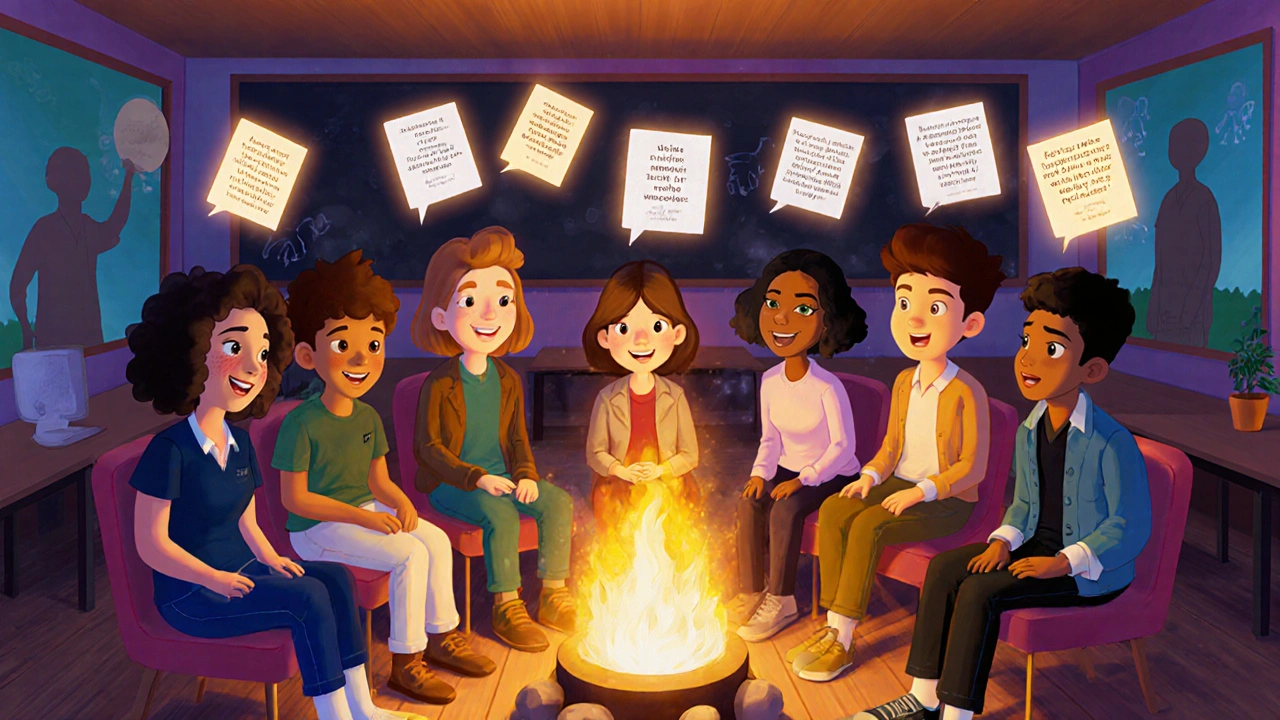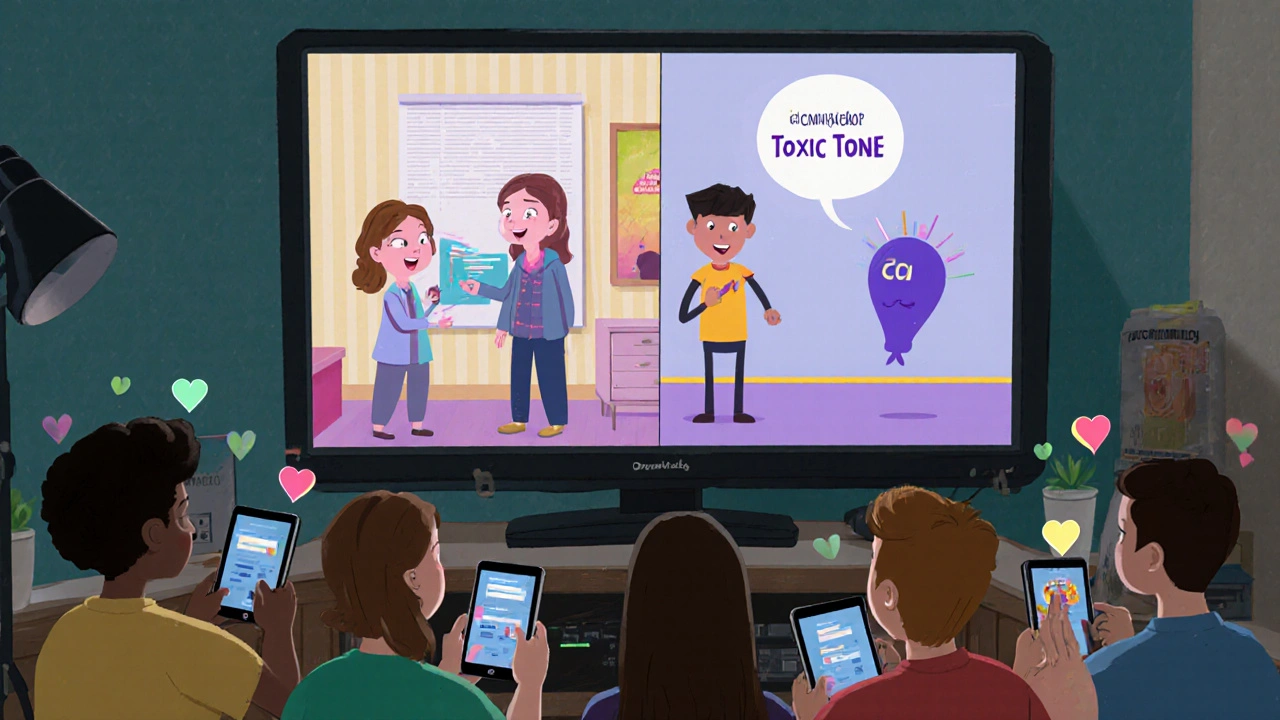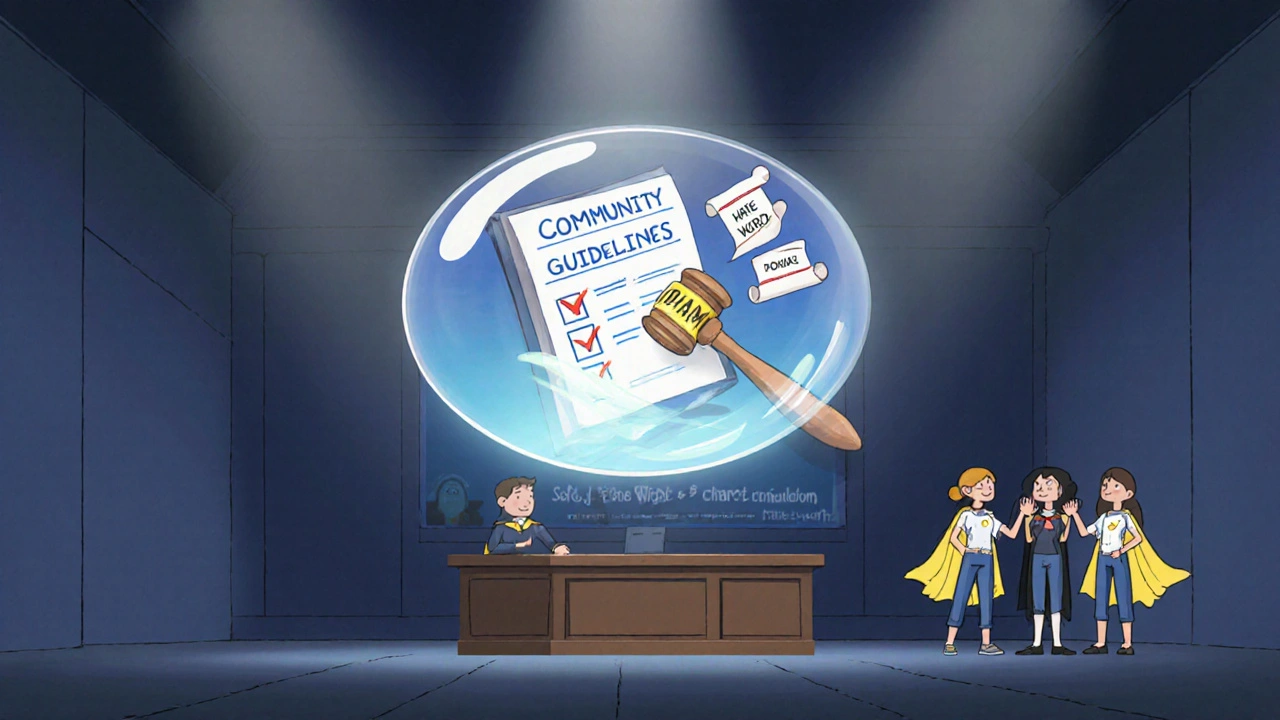Content Moderation and Community Guidelines for Online Courses
 Oct, 12 2025
Oct, 12 2025
When you sign up for an online course, you’re not just buying lessons-you’re joining a community. That community can be a place of growth, collaboration, and real connection. But without clear rules, it can also become a space where harassment, misinformation, or toxic behavior drives people away. That’s why content moderation and community guidelines aren’t optional for course creators-they’re essential.
Why Community Guidelines Matter More Than You Think
Most course platforms let instructors build their own spaces. A coding bootcamp on Discord. A language learning group on Slack. A yoga instructor’s private Facebook community. These aren’t just add-ons-they’re where real learning happens. But without boundaries, even the best course can fail.
Think about it: if someone posts a sexist comment in your French class group and no one responds, what does that tell the rest of the students? That it’s okay. That they’re not safe. That they shouldn’t speak up. A 2024 survey by the Online Learning Consortium found that 68% of learners left a course because of poor community behavior-not because the content was bad.
Clear guidelines prevent that. They set expectations before problems start. They tell people: This is how we treat each other here. And when someone breaks those rules, you have a clear path to act.
What Belongs in Your Community Guidelines
Your guidelines don’t need to be a legal document. But they do need to be specific, fair, and easy to understand. Here’s what works:
- Respect is non-negotiable. No personal attacks, slurs, or mocking. This includes tone-sarcasm that targets someone’s accent, background, or skill level counts.
- No spam or self-promotion. Don’t post links to your other courses, affiliate products, or YouTube channels unless it’s allowed in a designated thread.
- Keep discussions relevant. If your course is about Python automation, keep the chat about Python automation. Off-topic rants about politics or celebrity gossip belong elsewhere.
- Protect privacy. Don’t share screenshots of private messages. Don’t tag people without permission. Don’t post someone’s email or phone number.
- Report violations, don’t escalate. Encourage learners to report issues using a simple form or button, not to call out the person publicly.
One course creator in Portland added a short video to her welcome module: "Here’s what we expect in our community." She didn’t just list rules-she showed examples. One clip showed a respectful question. Another showed a comment that crossed the line. Then she asked learners: "Which one would you report?" It stuck. Participation went up. Reports dropped by 40% in three weeks.
How to Moderate Without Being the Police
You don’t need to be online 24/7 to keep your community safe. But you do need a system.
Start with a small team. Even one or two trusted students who’ve completed your course can help. Give them a simple checklist:
- Is this comment hostile, threatening, or discriminatory?
- Is this a sales pitch disguised as a question?
- Is this off-topic and distracting?
- Has this been reported before?
If the answer is yes to any of these, flag it. Don’t argue. Don’t explain. Just remove it and send a private message: "Your comment was removed because it violated our community guidelines. You’re welcome to rejoin the conversation if you follow the rules. Here’s a link to them again."
Automate what you can. Use tools like Discord’s AutoMod a built-in filter that blocks hate speech, spam, and links based on custom rules, or Slack’s keyword filters a feature that flags or blocks messages containing specific words or phrases. Set up alerts for words like "hate," "stupid," "bitch," or "fake"-but don’t rely on them alone. Context matters.
And always document. Keep a log of every removal, warning, or ban. Not to punish, but to protect yourself. If someone claims they were treated unfairly, you can show: "Here’s what happened, here’s the rule they broke, here’s how we responded."

What Not to Do
Here are three common mistakes that make moderation worse:
- Being inconsistent. If you delete one person’s comment but ignore another’s identical one, trust collapses. Apply rules equally, no matter who the person is.
- Ignoring gray areas. A comment like "I’m not sure this is right, but I’ve heard this before" might seem harmless. But if it’s spreading misinformation about a medical course or financial advice, it’s dangerous. Train your moderators to flag anything that could mislead learners.
- Waiting for complaints. Don’t wait for someone to scream "This is toxic!" before you act. Look for silence. If a once-active group has gone quiet, something’s wrong.
One instructor in Texas ran a course on digital marketing. She noticed that after a few weeks, no one was asking questions in the group. She checked the logs. A student had posted a question about ad targeting-and another student replied, "You’re too new to get this." The comment was deleted, but the damage was done. The quiet group didn’t come back until she personally reached out to 12 learners and apologized.
When to Ban Someone
Banning should be rare-and always last. But sometimes, it’s the only way to protect the group.
Here’s when to consider it:
- Repeated violations after warnings
- Threats of violence or doxxing
- Sexual harassment or predatory behavior
- Using the course to recruit for scams, cults, or extremist groups
When you ban someone, send a clear, calm message. No anger. No drama. Just facts: "You’ve been banned from this course community because you repeatedly violated our guidelines on respect and safety. This is final. If you’d like to appeal, email [address] within 14 days."
And never ban in public. Never respond to angry comments with more anger. Your community is watching how you handle conflict. Handle it with integrity.

Building a Culture, Not Just Rules
The best communities don’t just follow rules-they live them. That’s why your guidelines should be part of your course culture, not just a page you link to.
Start your course with a welcome activity: "Share one thing you hope to learn here-and one thing you want to see more of in this group." Let people co-create the tone.
Highlight good behavior. When someone helps another student, thank them publicly. Say: "Thanks, Maria, for explaining that so clearly. That’s exactly the kind of support we want here."
And make it easy to give feedback. Add a simple form: "What’s one thing we could do to make this community better?" Review it monthly. Adjust your guidelines as you learn.
Legal Risks You Can’t Ignore
Community guidelines aren’t just about kindness-they’re about legal safety.
If a learner is harassed in your course group and you did nothing, you could be liable under anti-discrimination laws like Title IX (for U.S. educational programs receiving federal funds) or the EU’s Digital Services Act. Even if you’re not a school, if you’re offering paid courses, regulators can hold you accountable.
Having clear, enforced guidelines shows you took reasonable steps to prevent harm. That’s your legal shield.
Also, make sure your terms of service include a clause that says: "We reserve the right to remove content or ban users who violate our community guidelines." And update it yearly. Laws change. So should your rules.
Final Thought: Safety Is Part of the Curriculum
Learning isn’t just about what’s on the screen. It’s about how you feel while you’re learning. If your students are afraid to speak up, they’re not learning. They’re surviving.
Good content moderation doesn’t stifle discussion-it makes it better. It lets people ask dumb questions. It lets shy learners join in. It lets people from different backgrounds feel like they belong.
Your course isn’t just teaching Python, French, or graphic design. It’s teaching people how to learn together. That’s the real value. And it only works when everyone feels safe.
Do I need community guidelines if my course is small?
Yes-even small groups need rules. A group of 10 people can still have toxic behavior. Without guidelines, one person’s disrespect can ruin the experience for everyone. Starting early makes it easier to set the tone before problems grow.
Can I copy guidelines from another course?
You can use them as inspiration, but don’t copy them directly. Every course has a different audience, platform, and purpose. A coding course needs different rules than a meditation class. Tailor them to your students’ needs and your platform’s tools.
What if a student says the rules are too strict?
Listen. Ask them what part feels too strict and why. Sometimes, it’s a wording issue-not the rule itself. You might adjust phrasing without changing the intent. But don’t weaken rules just to please someone. Safety isn’t negotiable.
How often should I update my guidelines?
Review them every 6 to 12 months. Look at your moderation logs. What kinds of issues keep coming up? Are new platforms or tools changing how people interact? Update your rules to match real behavior-not just what you hoped for.
Do I need to moderate private messages?
No, unless a private message becomes a public threat or involves illegal activity. You can’t monitor every DM. But if someone reports harassment via private message, take it seriously. Ask for screenshots (if allowed by platform rules) and act. Your duty is to protect your community, even when harm starts in private.
Kieran Danagher
October 30, 2025 AT 03:34Been moderating course communities for five years. The only thing that actually works is consistency and zero tolerance for toxicity. No gray areas. No "but they meant well." If it violates the rule, it’s gone. Period.
Santhosh Santhosh
November 1, 2025 AT 03:05I run a small Bengali language learning group with just 14 people. We don’t have fancy tools, just a WhatsApp group and a printed PDF of our three rules: No mocking accents, no politics, and always say thank you. Guess what? People stay. People help each other. It’s not about size-it’s about respect. I’ve seen quiet learners become the most active just because they felt safe.
Veera Mavalwala
November 2, 2025 AT 15:09Oh honey, you think this is about guidelines? No. This is about power. Who gets to decide what’s "toxic"? Who gets to silence the "off-topic" voices? I’ve seen so-called "safe spaces" become echo chambers where only the politically correct dare speak. Your "respect" is just another word for conformity. And let’s not pretend these rules don’t get weaponized. I’ve watched good people get banned for saying "I don’t agree"-while the real trolls, the ones with the right hashtags, get a free pass. This isn’t moderation. It’s cultural policing dressed up in corporate jargon.
Ray Htoo
November 3, 2025 AT 21:06Love the part about highlighting good behavior. I started doing that in my UX design course-every Friday I’d shout out someone who helped another student. Not just "thanks"-I’d quote their exact words. "Liam, you broke down Figma layers like a pro. That’s the kind of clarity we need." Within two weeks, the whole group started doing it themselves. People began tagging each other: "@Jen, you explained this better than the video." It became a culture, not a rule. No moderator needed. Just recognition.
Natasha Madison
November 4, 2025 AT 03:34They’re coming for your freedom. First it’s "no hate speech," then it’s "no offensive tone," then it’s "no questioning the curriculum." Soon you won’t be allowed to say "I think" without a diversity training certificate. This isn’t safety-it’s thought control. And who’s behind it? Big EdTech. They want you dependent on their platforms, their rules, their algorithms. They don’t care if you learn-they care if you comply. Wake up.
Sheila Alston
November 5, 2025 AT 18:00It’s disgusting how some people still think moderation is optional. If you’re charging money for a course, you’re running a business-and businesses have a duty to protect their customers. Letting someone say "You’re too stupid to understand this" isn’t freedom of speech-it’s emotional abuse. And if you’re not acting on it, you’re complicit. I’ve seen people quit their entire careers because of this kind of behavior in online courses. Don’t be the enabler. Enforce the rules. Every. Single. Time.
sampa Karjee
November 6, 2025 AT 07:55Guidelines? Please. Real education happens in chaos. You can’t sanitize discourse. If someone can’t handle being challenged, they shouldn’t be in a course. I’ve taught in 17 countries. The students who thrive are the ones who can take heat. The ones who cry over a sarcastic comment? They’re not ready for the real world. Your rules are infantilizing learners. Stop treating them like toddlers who need a bedtime story about "respect." And for god’s sake, don’t use Slack filters. That’s not moderation-that’s algorithmic cowardice.
Patrick Sieber
November 7, 2025 AT 11:31One thing I’ve learned: people follow rules better when they helped write them. I had my students draft the guidelines together in Week 1. We voted on each point. The "no self-promotion" rule? That came from a student who got spammed 12 times in two days. The "report, don’t call out" rule? From a quiet guy who said he’d never speak up if he had to publicly shame someone. Now I just point to the doc we made together. No arguing. Just "You helped write this. What do you think?" Works every time.
OONAGH Ffrench
November 9, 2025 AT 03:01Rules are the skeleton. Culture is the blood. You can have perfect guidelines and still have a dead community if no one feels seen. The quiet ones. The new ones. The ones who speak with an accent. The ones who don’t know the jargon. They don’t need more rules. They need someone to say: You belong here. Not because the policy says so. But because you said so.
poonam upadhyay
November 10, 2025 AT 02:08Ugh, I’ve seen this so many times. "Oh, just set some guidelines!" But then the same person ignores the first 3 violations because they "like the person’s vibe." Then they delete someone’s comment because they used the word "stupid"-but they let someone else say "you’re so dumb, how are you even in this course?" And then they wonder why the group is dead. It’s not about the rules-it’s about consistency. And honesty. And not being a hypocrite. Also, why do you always use "they" instead of "you"? Like you’re not the one who has to enforce this? You’re the instructor. Do your job.
Shivam Mogha
November 10, 2025 AT 10:15Yes. Do it.
Rocky Wyatt
November 10, 2025 AT 17:23Oh so now we’re supposed to be therapists AND content creators? I didn’t sign up to mediate emotional breakdowns because someone got called out for misspelling "Python." I run a 500-student course. If I have to personally respond to every passive-aggressive comment, I’ll quit by next week. This isn’t a support group-it’s a course. If you can’t handle a little friction, go take a mindfulness class. And for the love of god, don’t tell me to "highlight good behavior"-I’ve got 12 assignments to grade and a family to feed. This post reads like a TED Talk written by someone who’s never had to manage a real online group.